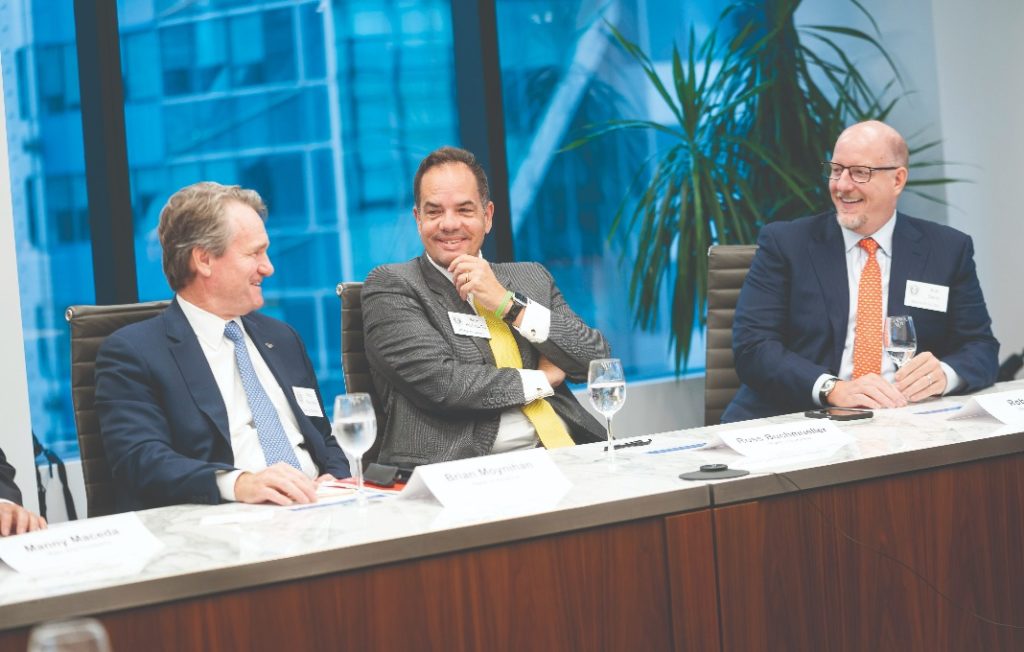The New Art Of Decision-Making


CEOs are leading in a time of constant transformation and relentless pressure, facing unending streams of decisions that must be made—at lightning speed, with imperfect information. At the same time, they must manage the risks those decisions pose to their companies and ensure that leaders lower down in the organization are armed with the data needed to take smart risks, avoid wrong decisions and, if necessary, fail quickly.
That’s a harder task than ever in the climate of remote work, where some employees have yet to step into the office for the first time, agreed CEOs gathered for a roundtable discussion cosponsored by PURE Group of Insurance Companies.

“You have a whole generation of people who are coming into the firm who haven’t been inculcated in the values of the firm,” said Manny Maceda, worldwide managing partner for Bain & Co. “The first line of defense in risk-taking is decision-making by the leaders. We can put in all the risk management processes—and we do—but often, the frontline decisions, particularly for us as a service industry, require people with a set of values, who have some ability to make tradeoffs.”
That’s because while availability of data can give decision-makers better footing, it can’t replace knowledge born of experience. “That’s part of the issue,” said Ross Buchmueller, group president and CEO of PURE. “We think about how we use data to inform decision-making, but we also use our experiences. And when [employees] don’t have a lot of experiences, you’ve got to really have a good infrastructure.”
Newer employees who have not had a chance to learn at the feet of veterans might be lacking the kind of institutional knowledge needed to take calculated risks while not repeating past mistakes, said Bank of America CEO Brian Moynihan. “There’s nobody really much under the age of 35 or 40 who knows what happened in the financial crisis. And now you’re seeing home prices go up again, and you’re thinking, do people recognize the same issues? Especially now that you have three years of college kids coming in who have never seen a boss.”
There’s also only so much you can do on Zoom, Maceda added. “It’s more efficient, and it’s a better carbon footprint for those who air travel as a meaningful portion. But does it train an entire generation to make good choices, which is always going to be the frontline for risk management? I don’t think it’s sufficient.”
The fact that employees have not had a chance to work side-by-side is also problematic, said Simon Freakley, CEO of AlixPartners. “Best performance is actually well-performing teams, not just well-performing individuals. And what makes well-performing teams is people working in team rooms together, actually learning from one another, because it’s somewhat of an apprenticeship model,” he said. “When our people make terrible decisions, and hopefully it’s not that often, but it’s usually when they’re on their own. When you’re dealing with a knotty problem, sitting around in person creates an energy and a discussion that is helpful.”

Despite its limitations, the technology has been helpful for newly minted CEOs who would otherwise have an impossible time communicating culture during a pandemic. Christine Miller stepped into the top job at Melinta Therapeutics in August 2020. “I used Zoom as an opportunity to get to know people. I was able to reach very deeply into the organization, and a big focus that I had was really around understanding the culture of the organization.” What did she discover? “There was no culture. The previous leaders had done acquisitions but had not intentionally integrated the cultures or set forth what it should be.”
Without that, employees would have no foundation for savvy decision-making. So Miller spent much of her time initially working on establishing culture, and then it all came back to team creation. “It’s just not good enough to bring in people who know what to do—they have to be able to work together as a team. So I have an advisory group that works with us to provide coaching for my executive team, because leading organization through a transformation is much different than a startup company—you still have some of the old ghosts from the past.”
For Robert Davis, who became Merck’s new CEO in July following Ken Frazier’s retirement, teamwork will be the key to innovation. “That’s the big thing I’m trying to drive—one Merck, one team, unified behind the purpose. And as long as we put the patient at the center, we understand what we’re focused on and driving toward.”
When Bank of America made the decision in 2014 to settle with the Justice Department to end litigation that had plagued the bank since the end of the financial crisis, the board ultimately supported it, said Moynihan. “But the trick was getting the board to understand all the facts and nuances” to get to an agreement.
That can be challenging when a crisis hits, and the source of that crisis isn’t necessarily in the wheelhouse of the board’s collective skills, said Freakley. “So these are complex issues where many of your board members have no experience… And particularly when it’s around a big legal issue, to bring the board’s understanding up to a point where they can have a view is a real challenge. And you don’t have a lot of time.”

“That’s why you have to have CEOs” on the board, said Moynihan, “because they have faced that kind of ‘the buck doesn’t stop anyplace but right here’ [and] have had to make those decisions, whether it’s a decision to sell or to buy or to settle a case. They understand the process—you have to make a decision, and you have to make a decision that no one else is going to be able to help you make.”
That’s one of the reasons Neil McFarlane, when he took over as CEO of Adamas Pharmaceuticals in 2019, brought in a new board member who had been the general counsel of a large multinational biopharma. Adamas was dealing with six ongoing lawsuits at the time. “I needed somebody on that board who had been through the wringer…[and] could actually help explain some of the decisions that were coming [down],” he said. He also spent considerable time with every member of the board. “I wanted to make sure these were the kinds of people who were going to be there for me, who I could learn from, who were interested in change.”
McFarlane pointed out that when making decisions about settling litigation, CEOs have to factor in the time it will take to win the lawsuit, as well as the uncertainty in the market during that time. “[It] was really stopping people in that mid-cap area from taking a flyer on a great product that made a tremendous difference in the lives of patients,” he said. “That uncertainty was a killer.”
Freakley noted that stakeholders also don’t respond well to uncertainty around issues like social justice, racial equality, environmental issues, etc., and that CEOs have to be prepared to react decisively. “We can’t wait for our internal comms people or our PR agents to be drafting stuff for us,” he said. “Chief executives have to be their own chief communication officers.”
Making tough decisions during a crisis can be painful but will also usually reveal your star talent, said Steven Collis, chairman, president and CEO of AmerisourceBergen. “That is where you learn what people are made of. It is a fascinating time to watch the decision quality.” He recalled that several executives were due to retire during the pandemic, requiring some leadership restructuring. “Some of the people who performed well in this crisis got to the management table because of it, and they’re fantastic leaders,” he said. “People say crisis makes character—I think it reveals character.”
Moynihan agreed. During the shutdown and economic crisis brought on by the global pandemic, Bank of America employees and executives had to work around the clock—including on Easter Sunday—to get PPP loans done. “That quickly sorts the energy takers from the energy givers. And it quickly sorts of people who will make decisions when they have to.”
Disruption does create opportunity, said Miller. “It’s just having that mindset for you to look for it. My dad always says, ‘Don’t waste a good crisis’ because there’s definitely a good opportunity, and you have to have people who are level-headed and solution-oriented. You will have people who will create spin and drama, and you don’t need those people in leadership roles. But if you can get people to stay level-headed and look for the upside opportunity, you’ll benefit from it.”

Chief Executive Group exists to improve the performance of U.S. CEOs, senior executives and public-company directors, helping you grow your companies, build your communities and strengthen society. Learn more at chiefexecutivegroup.com.
0

1:00 - 5:00 pm
Over 70% of Executives Surveyed Agree: Many Strategic Planning Efforts Lack Systematic Approach Tips for Enhancing Your Strategic Planning Process
Executives expressed frustration with their current strategic planning process. Issues include:
Steve Rutan and Denise Harrison have put together an afternoon workshop that will provide the tools you need to address these concerns. They have worked with hundreds of executives to develop a systematic approach that will enable your team to make better decisions during strategic planning. Steve and Denise will walk you through exercises for prioritizing your lists and steps that will reset and reinvigorate your process. This will be a hands-on workshop that will enable you to think about your business as you use the tools that are being presented. If you are ready for a Strategic Planning tune-up, select this workshop in your registration form. The additional fee of $695 will be added to your total.

2:00 - 5:00 pm
Female leaders face the same issues all leaders do, but they often face additional challenges too. In this peer session, we will facilitate a discussion of best practices and how to overcome common barriers to help women leaders be more effective within and outside their organizations.
Limited space available.

10:30 - 5:00 pm
General’s Retreat at Hermitage Golf Course
Sponsored by UBS
General’s Retreat, built in 1986 with architect Gary Roger Baird, has been voted the “Best Golf Course in Nashville” and is a “must play” when visiting the Nashville, Tennessee area. With the beautiful setting along the Cumberland River, golfers of all capabilities will thoroughly enjoy the golf, scenery and hospitality.
The golf outing fee includes transportation to and from the hotel, greens/cart fees, use of practice facilities, and boxed lunch. The bus will leave the hotel at 10:30 am for a noon shotgun start and return to the hotel after the cocktail reception following the completion of the round.